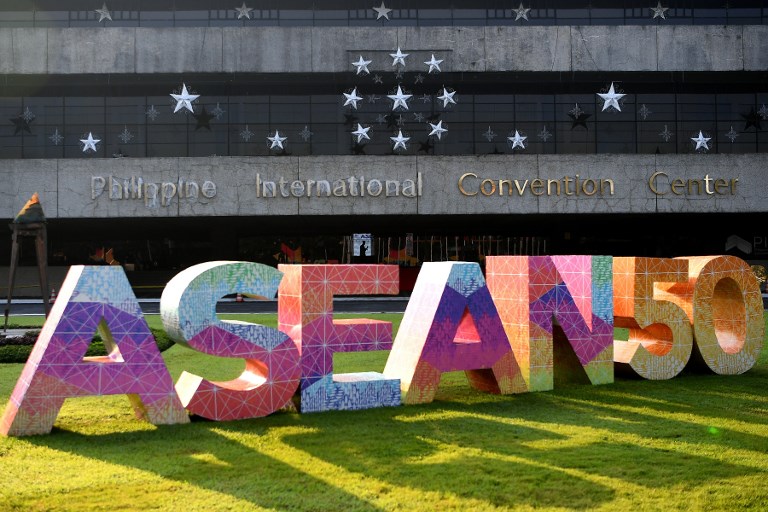Asean execs to decide on mega trade deal

An ASEAN signage is seen outside the Philippine International Convention Center, the venue of the upcoming the 31st Association of Southeast Asian Nations (ASEAN) Summit, in Manila on November 11, 2017. / AFP PHOTO / MANAN VATSYAYANA
Asean Economic Ministers (AEM) are expected to announce this week whether or not they have reached a substantial conclusion of the Regional Comprehensive Economic Partnership (RCEP), a mega trade deal among countries that account for around 30 percent of the global economy.
The much awaited 31st Asean Summit and Related Meetings is officially scheduled today until tomorrow Nov. 14, which would be participated in by a number of state leaders, according to a copy of the schedule sent to media. The Philippines chairs the Asean (Association of Southeast Asian Nations) this year, marking the 50th anniversary of the bloc.
Trade and Industry Secretary Ramon Lopez, who heads the AEM this year, has been calling for the substantial conclusion of the trade deal, which was tagged as one of the priority deliverables of the Philippines for this year.
However, contentions among some member-countries keep the parties from reaching a consensus. To recall, Lopez even called on some free trade agreement (FTA) partners to have “more realistic ambitions” during a press briefing in September.
The ongoing trade talks, which would potentially create the world’s biggest trade bloc, is participated by the 10 Asean member-states along with six FTA partners —Australia, New Zealand, India, Korea, Japan and China.
RCEP becomes increasingly more important after a comparatively large trade deal, the Trans-Pacific Partnership (TPP), was deemed dead by many without US participation. US President Donald Trump, whose leadership has raised fears of US protectionism, is also expected to attend the Asean summit.
It remains to be seen what passes for a substantial conclusion, however, given some opposition being raised by some countries that prevent RCEP member-states from reaching a consensus. Lopez previously clarified that a substantial conclusion did not mean that the actual agreement would be signed this year. Instead, it meant only a consensus on the basic framework for the RCEP.
“We need to take a collective stance and arrive at a clear consensus on the vital elements for this agreement. Let us not miss the opportunity of announcing a substantial conclusion of RCEP negotiations especially in November, or a significant breakthrough to culminate our celebration of Asean’s golden jubilee year,” Lopez said in September during the opening ceremony of the 49th AEM and related meetings.
In the same month, the parties involved endorsed a “key elements” document, a text which Lopez said reinforced the “Asean centrality” of the trade talks. In essence, the document pertained to Asean’s position on different issues in the RCEP negotiations, including tariff liberalization and the timeframe for its implementation.
FTA partners were expected to come up with counteroffers in response to the document.
Further details of the trade talks have been kept secret, but Lopez said the Asean found it difficult to reach an agreement with some FTA partners—which he did not name—regarding the extent of liberalization in the trade in goods. He said the Asean would not accept an offer higher or lower than 92 percent.
According to Asean Deputy Secretary General Lim Hong Hin, the resulting figure should build on the current FTAs that the Asean already had.
“The guiding principle builds upon the Asean+1 FTAs. Under the Asean+1 FTA, the tariff level inclusion varies from one FTA to another. However, the medium for the Asean+1 FTA is 90.3 percent. If we’re going to build upon the Asean+1 FTA, we need to go higher,” he said in September.














